In January 2009, Peanut Corporation of America (PCA) was linked to a growing outbreak of illness across the U.S. caused by Salmonella serotype Typhimurium. Eventually, all peanuts and peanut products processed at PCA’s Blakely, Georgia, plant since January 1, 2007 were .jpg) recalled, including over 3,900 peanut butter and other peanut-containing products from more than 350 companies. The U.S. Centers for Disease Control and Prevention (CDC) reported that 691 people were sickened and nine died across 46 U.S. states and in Canada from the outbreak.
recalled, including over 3,900 peanut butter and other peanut-containing products from more than 350 companies. The U.S. Centers for Disease Control and Prevention (CDC) reported that 691 people were sickened and nine died across 46 U.S. states and in Canada from the outbreak.
By Feb. 15, 2009, The Washington Post described the business culture at PCA from the viewpoint of a former buyer for a major snack manufacturer — a filthy plant with a leaky roof and windows that were left open, allowing birds to enter. The company purchased only low quality, inexpensive peanuts and paid food handlers the minimum wage lawfully allowed. The lack of a food safety culture was most evident in the description of how PCA dealt with finished product that tested positive for Salmonella spp. A report by the U.S. Food and Drug Administration identified many instances in which the product was retested until a negative result was achieved; in other instances PCA shipped the product to their customer despite the positive test or before the test result was received.
FDA further noted there were inadequate controls at the PCA plant to prevent contamination and insufficient cleaning and sanitation. Facilities for handwashing were also used to clean utensils and mops, increasing the potential for recontamination of washed hands. Equipment settings — for example, roasting temperature and belt speed — had not been evaluated to ensure that the roasting step was sufficient to kill bacteria. Raw and roasted peanuts were stored directly next to one another, allowing for potential contamination of the roasted finished product. Gaps in the physical integrity of the building were observed around the loading (1).jpg) bays and the air conditioning intakes in the roof that provided pests with open access to the plant. Despite these deficiencies, PCA maintained the highest possible rating from auditing firm AIB International.
bays and the air conditioning intakes in the roof that provided pests with open access to the plant. Despite these deficiencies, PCA maintained the highest possible rating from auditing firm AIB International.
Earlier this year, Basic Food Flavors Inc., the Las Vegas company at the center of a recall of more than 100 food products containing hydrolyzed vegetable protein, or HVP, continued to make and distribute food ingredients for about a month after it learned salmonella was present at its processing facility, according to a Food and Drug Administration report.
Yesterday, similarly eerie details started to emerge from investigators going through the salmonella-in-eggs mess that has sickened almost 1,500 over the summer and led to the recall of about 550 million eggs. Highlights of the reports (called 483s) and public comments by FDA-types include:
• David Elder, director of the FDA’s Office of Regulatory Affairs, told a press conference Monday the 483 forms show "significant objectionable conditions;"
• at Wright County Egg facilities, live mice were found inside laying houses at four sites, and numerous live and dead flies were observed in egg-laying houses at three locations;
• chicken manure accumulated 4 to 8 feet high underneath the cages at two locations, pushing out access doors, allowing open access for wildlife and other farm animals;
• at one location, uncaged birds were using tall manure piles to access egg-laying areas;
• inspectors saw employees not changing or not wearing protective clothing when moving from laying house to laying house;
• three Hillandale Farms locations contained unsealed rodent holes with evidence of live rodents at one of the facilities, with gaps in walls and doors at other sites.; and,
• uncaged chickens were observed tracking manure into the caged hen areas.
Dr Michael Taylor, the FDA’s deputy commissioner for foods, told reporters that though the FDA has no reason to believe the practices that investigators turned up are common at all egg-producing facilities, inspectors will be inspecting about 600 large egg producers, those that have 50,000 or more laying hens, over the next several months starting in September with what it believes may be the highest-risk facilities.
Kenneth E. Anderson, a professor of poultry science at North Carolina State University said,
“That is not good management, bottom line. I am surprised that an operation was being operated in that manner in this day and age.”
(1).jpg) How did this happen? A gap in federal or state inspection requirements may be partly to blame – but only partly.
How did this happen? A gap in federal or state inspection requirements may be partly to blame – but only partly.
What firms and retailers were buying these eggs? Don’t they require internal or third-party food safety audits of their suppliers? Who were the auditors and where are their reports? Has any buyer looked at owner Jack DeCoster over the years and said, your farm’s a dump, I’m not buying your eggs?
While waiting for government and Godot, it’s the thousands of American egg farmers who are going to suffer if sales decline, so why not unleash the power of food safety marketing and let consumers choose at retail.
Repeated outbreaks have shown that all food is not safe: there are good producers and bad producers, good retailers and bad retailers. As a consumer, I have no way of knowing. Telling me an egg is local and grown with love is food marketing but has nothing to do with food safety and salmonella.
Tell consumers about salmonella-testing programs meant to reduce risks; put a URL on egg cartons so those who are interested can use the Internet or even personal phones to see how the eggs were raised. Boring press releases in the absence of data only magnify consumer mistrust.
Food producers should truthfully market their microbial food safety programs, coupled with behavioral-based food safety systems that foster a positive food safety culture from farm-to-fork. The best producers and processors will go far beyond the lowest common denominator of government and should be rewarded in the marketplace.
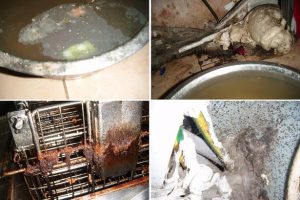 They found mouse dropping throughout the premises – including on a chopping board and in open sacks of flour – in addition to filthy kitchen equipment and old food stuck to surfaces.
They found mouse dropping throughout the premises – including on a chopping board and in open sacks of flour – in addition to filthy kitchen equipment and old food stuck to surfaces.
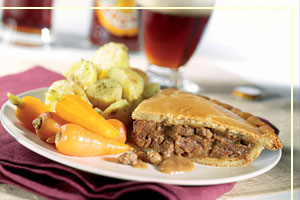 a renovation and have improved their practices to meet the ACT’s legal guidelines.
a renovation and have improved their practices to meet the ACT’s legal guidelines..jpg) But does the link between a filthy toilet and a dirty prep table even make sense? Hard data is rare. Though health and restaurant inspectors do check for the general appearance of cleanliness in restrooms and dining areas, they save their swabs and scientific gauges for the food-prep areas.
But does the link between a filthy toilet and a dirty prep table even make sense? Hard data is rare. Though health and restaurant inspectors do check for the general appearance of cleanliness in restrooms and dining areas, they save their swabs and scientific gauges for the food-prep areas..jpg) you want to sing "Happy Birthday" to yourself while you do it, but he’d rather you count than sing kiddie songs.
you want to sing "Happy Birthday" to yourself while you do it, but he’d rather you count than sing kiddie songs.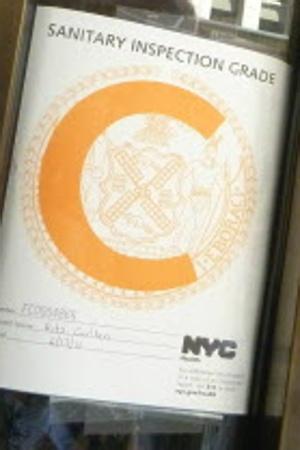 (not surprising!) and spoke to potential diners who seemed turned off (right, photo from Post). A tourist said, "We do like to go to upscale restaurants when we’re here, but I don’t expect that type of grade from a restaurant of this level of quality. It taints it. No, I won’t be going.”
(not surprising!) and spoke to potential diners who seemed turned off (right, photo from Post). A tourist said, "We do like to go to upscale restaurants when we’re here, but I don’t expect that type of grade from a restaurant of this level of quality. It taints it. No, I won’t be going.” between cooked and raw meat, and poor hygiene among kitchen workers, the DOH website said.
between cooked and raw meat, and poor hygiene among kitchen workers, the DOH website said. food poisoning.
food poisoning.
.jpg) recalled, including over 3,900 peanut butter and other peanut-containing products from more than 350 companies. The U.S. Centers for Disease Control and Prevention (CDC) reported that 691 people were sickened and nine died across 46 U.S. states and in Canada from the outbreak.
recalled, including over 3,900 peanut butter and other peanut-containing products from more than 350 companies. The U.S. Centers for Disease Control and Prevention (CDC) reported that 691 people were sickened and nine died across 46 U.S. states and in Canada from the outbreak.(1).jpg) bays and the air conditioning intakes in the roof that provided pests with open access to the plant. Despite these deficiencies, PCA maintained the highest possible rating from auditing firm AIB International.
bays and the air conditioning intakes in the roof that provided pests with open access to the plant. Despite these deficiencies, PCA maintained the highest possible rating from auditing firm AIB International.(1).png) The restaurant inspection comes less than a week after Obama made his to-go order of two corned beef sandwiches on rye.
The restaurant inspection comes less than a week after Obama made his to-go order of two corned beef sandwiches on rye.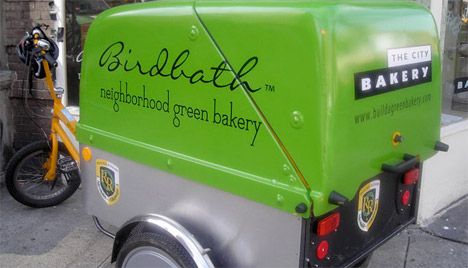 If the goal is to be New York City’s most sustainable bakery, then why not. But sustainable is not the same as sanitary.
If the goal is to be New York City’s most sustainable bakery, then why not. But sustainable is not the same as sanitary.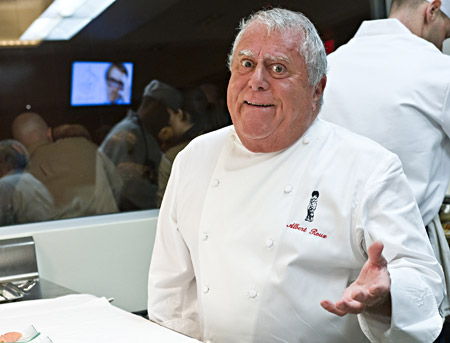 Some friendly food safety inspectors visited Chez Roux, which opened at Rocpool Reserve in April 2008, and found the place in violation of 11 food hygiene laws, including not washing dirty floors, failing to provide hygienic hand drying facilities, obstructing a hand wash basin, and preparing food next to a sink filled with dirty water.
Some friendly food safety inspectors visited Chez Roux, which opened at Rocpool Reserve in April 2008, and found the place in violation of 11 food hygiene laws, including not washing dirty floors, failing to provide hygienic hand drying facilities, obstructing a hand wash basin, and preparing food next to a sink filled with dirty water.